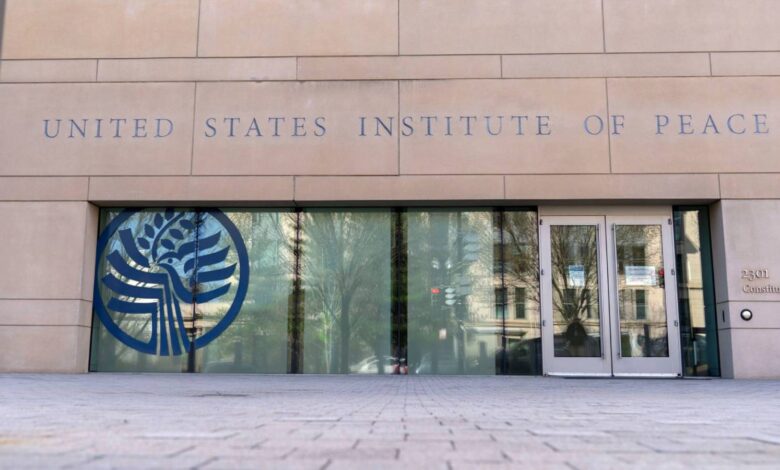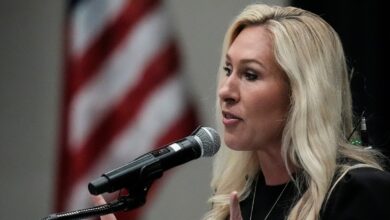DOGE Staffer Seizing U.S. Institute of Peace Sells ‘AI Workers’

If Elon Musk‘s so-called Department of Government Efficiency (DOGE) has its way, a 28-year-old college dropout guided by the right-wing libertarian ideologies of figures including Silicon Valley billionaire Peter Thiel and Argentine president Javier Milei will oversee the dismantling of a Washington nonprofit that promotes peace worldwide.
Following a February executive order from President Donald Trump aimed at reducing the agency to a “minimum presence and function required by law,” DOGE has aimed its chainsaw the U.S. Institute of Peace (USIP), a national independent nonprofit funded by Congress that advocates for conflict resolution abroad. The White House, bent on ending all kinds of foreign assistance, removed most of the institute’s board in mid-March. The remaining board members, including Defense Secretary Pete Hegseth and Secretary of State Marco Rubio, fired CEO George Moose — who had objected to DOGE’s occupation of USIP headquarters, arguing that the agency is not even part of the executive branch
Then Hegseth and Rubio filed an undated resolution to remove USIP’s acting president, Kenneth Jackson (an administrator who had previously helped to tear down the U.S. Agency for International Development), as well as its chief financial and operating officers. The document declared the appointment of DOGE staffer Nate Cavanaugh to the acting president role. The secretaries wrote that Cavanaugh would have “the authority and is instructed to transfer USIP’s assets, including USIP’s real property and rights thereof, and including all assets recently received from the Endowment, to the General Services Administration.” The GSA, an organizational agency where Cavanaugh draws an annual salary of $120,500 — almost as much as employees who have worked there for more than a decade — is one of the places where DOGE has concentrated its power over the federal bureaucracy. DOGE is even attempting to seize USIP’s $500 million headquarters for itself via the GSA, according to a Wired report.
On Monday, USIP filed a motion to prevent the transfer of its property to the GSA, contending that the dismissal of most of its headquarters staff and DOGE’s intrusions were unlawful. But given that a federal judge already declined to block DOGE from raiding the institution when it filed a motion for a temporary restraining order against the group, it seems more than plausible that Cavanaugh will soon be able to import USIP materials to the GSA, presumably to look for programs, contracts, and staff to be cut. He did not immediately reply to a request for comment from Rolling Stone as to plans for USIP, his opinion of its stated mission, or his qualifications for running it.
The remaining staff at USIP did not immediately respond to a request for comment on the mass firings and DOGE’s attempt to seize the nonprofit’s property. Regarding DOGE’s infiltration of the USIP building, Moose told reporters at the time, “It was very clear that there was a desire on the part of the administration to dismantle a lot of what we call foreign assistance, and we are part of that family.”
Cavanaugh’s résumé is not without impressive items (though his complete lack of government experience does not compare favorably to Moose’s nearly five decades of diplomacy work, beginning when he joined the U.S. Foreign Service in 1967). Even before Cavanaugh enrolled in college, he has said in an interview, he planned to drop out and become a tech entrepreneur as soon as possible. In his one year at the University of Indiana Bloomington — he chose the school because he wanted to follow in billionaire Mark Cuban’s footsteps — he founded the esports tournament platform Guuf and sold it after leaving higher education behind.
Since then, Cavanaugh has co-founded FlowFi, a financial services platform that connects small businesses with accounting and tax experts, a company that helped land him on the Forbes “30 Under 30” list of young entrepreneurs in 2021. But his previous venture is perhaps more revealing. Brainbase, which he also co-founded, offers business owners the opportunity to create “AI workers” to carry out tasks otherwise handled by employees, from sales calls and customer support to email support and human resources functions. Although the company originally focused on using artificial intelligence tools to track intellectual property through trademarks on copyright, it now touts its ability to outsource office management to an array of bots. One of DOGE’s key objectives is to apply generative AI models to automate work done by the civil service employees it is firing by the thousands.
It is curious that Cavanaugh would find himself a part of this mission given that he has often cited the late CEO of Intel Corp., Andrew Grove, as an important personal influence. In a 2010 Bloomberg column, the tech executive worried that startup culture was failing to create jobs in Silicon Valley, instead casting “masses of unemployed” outside its bubble of immense wealth. Yet Cavanaugh’s social media footprint reveals that he is more closely aligned with the moguls who have cast their lot with Trump. “I look to Peter Thiel for a lot of my thinking and modeling about the world and business,” he said in one interview, referring to the PayPal co-founder and venture capitalist, one of the president’s earliest backers in the startup world. “I think he’s one of the smartest people in the tech industry. His insights and predictions about markets, macro environment, and politics are quite good.” Perhaps Cavanaugh took inspiration from Palantir Technologies, a data analytics firm co-founded by Thiel that holds extensive defense contracts related to government surveillance, when he invested in Albedo, a company building low-orbit satellites that can zoom in to snap higher-resolution images of any spot on Earth, which has raised serious concerns from privacy experts.
On his X account, which is only sporadically active and has been dormant since January, Cavanaugh follows essentially no one except Big Tech and cryptocurrency figures, apart from the exceptions of President Trump and Vice President J.D. Vance. He has shared writing and posts by Thiel as well as Ben Horowitz and Marc Andreessen, partnered VCs who gave millions to a pro-Trump Super PAC in 2024. He has shown an admiration for billionaire hedge fund manager Bill Ackman, who also backed Trump in the last election, and called a 2024 speech at the World Economic Forum in Davos, Switzerland, by Argentine president Javier Milei “one of the most inspiring yet necessary talks I have heard in a long time.” In his remarks, the head of state — whose administrative cuts in his country were an inspiration for Musk’s chainsaw approach with DOGE — said that businesspeople are “social benefactors” and “heroes,” telling them: “Let no one tell you that your ambition is immoral. If you make money, it’s because you offer a better product at a better price.”
And, of course, in between quotes from the Chinese philosopher Confucius and former UFC campion Conor McGregor, found liable for sexual assault in a civil lawsuit in Ireland last year, Cavanaugh has celebrated content from Musk, his de facto boss and the most influential force among reactionary MAGA tech oligarchs. On Nov. 5, with Trump’s election victory assured, Cavanaugh reposted a meme that Musk had shared of himself standing in Oval Office holding a sink, captioned “Let that sink in!” The same night, Cavanugh posted that he was “Optimistic about the future.” His most recent activity on the platform was reposting a link from the official DOGE account to the executive order that formally established the initiative in January.
All told, Cavanaugh’s online presence suggests a confident young man with a worldview completely captured by Silicon Valley’s self-mythologizing, the belief that tech entrepreneurs are uniquely qualified to make decisions for everyone else, and the assumption that the rich and powerful in that industry have universally earned their privilege — as opposed to to anyone who might have benefited from considerations of diversity, equity, and inclusion. Last year, Cavanaugh shared a link to meritocracy.com, a website cataloguing comments about hiring only on “merit,” without regard for the DEI practices that right-wingers have come to demonize (and which has DOGE has stripped out of federal agencies). “Great to see,” Cavanaugh commented.
Just a few short months later, the Trump administration would be looking to install him as president of a nonprofit where he otherwise wouldn’t have had the background to secure an entry-level job, merely because he shares the same ideas as Musk and Trump and is willing to carry out their destructive agenda. That might be “merit” of a sort — though not of the usual definition.




